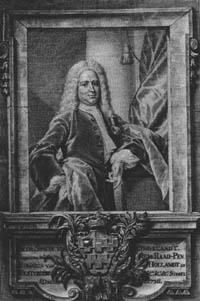
Simon van Slingelandt
Encyclopedia

Lord of the Manor
The Lordship of a Manor is recognised today in England and Wales as a form of property and one of three elements of a manor that may exist separately or be combined and may be held in moieties...
of Patijnenburg (January 14, 1664, Dordrecht
Dordrecht
Dordrecht , colloquially Dordt, historically in English named Dort, is a city and municipality in the western Netherlands, located in the province of South Holland. It is the fourth largest city of the province, having a population of 118,601 in 2009...
- December 1, 1736, The Hague
The Hague
The Hague is the capital city of the province of South Holland in the Netherlands. With a population of 500,000 inhabitants , it is the third largest city of the Netherlands, after Amsterdam and Rotterdam...
) was Grand Pensionary
Grand Pensionary
The Grand Pensionary was the most important Dutch official during the time of the United Provinces. In theory he was only a civil servant of the Estates of the dominant province among the Seven United Provinces: the county of Holland...
of Holland from July 17, 1727 to December 1, 1736.
Simon van Slingelandt was the son of Govert van Slingelandt, lord of Dubbeldam
Dubbeldam
Dubbeldam is a former village in the Dutch province of South Holland. It was located to the east of the city of Dordrecht. It is now a part of that city.Dubbeldam was a separate municipality until 1970, when it merged with Dordrecht]....
(1623-1690), pensionary of Rotterdam
Rotterdam
Rotterdam is the second-largest city in the Netherlands and one of the largest ports in the world. Starting as a dam on the Rotte river, Rotterdam has grown into a major international commercial centre...
and ambassador
Ambassador
An ambassador is the highest ranking diplomat who represents a nation and is usually accredited to a foreign sovereign or government, or to an international organization....
to Prussia
Prussia
Prussia was a German kingdom and historic state originating out of the Duchy of Prussia and the Margraviate of Brandenburg. For centuries, the House of Hohenzollern ruled Prussia, successfully expanding its size by way of an unusually well-organized and effective army. Prussia shaped the history...
, Sweden
Sweden
Sweden , officially the Kingdom of Sweden , is a Nordic country on the Scandinavian Peninsula in Northern Europe. Sweden borders with Norway and Finland and is connected to Denmark by a bridge-tunnel across the Öresund....
, Poland
Poland
Poland , officially the Republic of Poland , is a country in Central Europe bordered by Germany to the west; the Czech Republic and Slovakia to the south; Ukraine, Belarus and Lithuania to the east; and the Baltic Sea and Kaliningrad Oblast, a Russian exclave, to the north...
(1656) and Denmark
Denmark
Denmark is a Scandinavian country in Northern Europe. The countries of Denmark and Greenland, as well as the Faroe Islands, constitute the Kingdom of Denmark . It is the southernmost of the Nordic countries, southwest of Sweden and south of Norway, and bordered to the south by Germany. Denmark...
(1659). He was also the secretary of the Council of State
Dutch Council of State
In the Netherlands, the Council of State is a constitutionally established advisory body to the government which consists of members of the royal family and Crown-appointed members generally having political, commercial, diplomatic, or military experience...
in 1664
Before becoming grand pensionary Van Slingelandt wrote several reports as preparation for the second Great Assembly (Dutch
Dutch language
Dutch is a West Germanic language and the native language of the majority of the population of the Netherlands, Belgium, and Suriname, the three member states of the Dutch Language Union. Most speakers live in the European Union, where it is a first language for about 23 million and a second...
Tweede Grote Vergadering , a kind of Constitutional Convention to reform the constitution of the Dutch Republic, 28 November 1716-14 September 1717), in which he proposed to give the Council of State ("Raad van State") more power. He was convinced of the necessity to restrict the power of the cities and the provinces in order to strengthen the central power of the republic. The Great Assembly however ended in failure when nothing came from Van Slingelandts proposed reforms.
He was powerful in the United Provinces
Dutch Republic
The Dutch Republic — officially known as the Republic of the Seven United Netherlands , the Republic of the United Netherlands, or the Republic of the Seven United Provinces — was a republic in Europe existing from 1581 to 1795, preceding the Batavian Republic and ultimately...
, being the grand pensionary of Holland, which contributed sixty percent of the tax income of the republic. Van Slingelandt was a staunch republican, who wanted to keep the House of Orange out of the centre of power. He was a strong advocate of an alliance with Great Britain; otherwise, he thought, the United Provinces wouldn't survive. He mediated peace between Great Britain and Austria in 1732 and between France and Austria in 1736.
Simon van Slingelandt, a Master of Laws
Master of Laws
The Master of Laws is an advanced academic degree, pursued by those holding a professional law degree, and is commonly abbreviated LL.M. from its Latin name, Legum Magister. The University of Oxford names its taught masters of laws B.C.L...
, was married to Susanna de Wildt (1666-1722) and Johanna Margaretha van Coesvelt, his housemaid (1726-1736)

